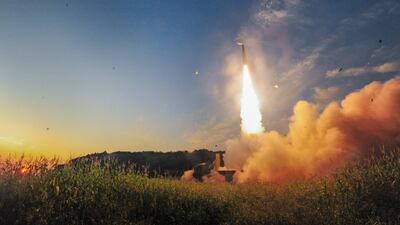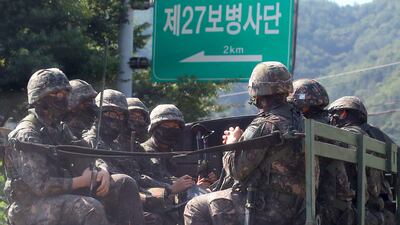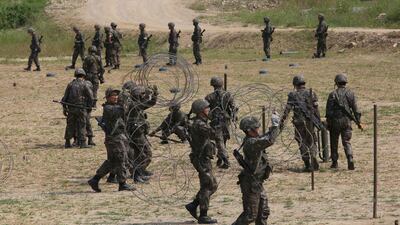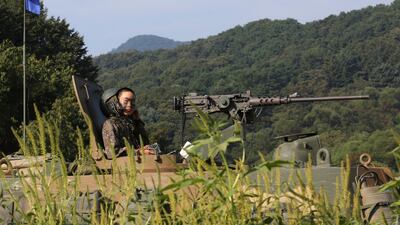South Korea's military fired a volley of ballistic missiles into the sea in a simulation attack on the North's nuclear test site on Monday.
The live fire drill comes one day after Pyongyang tested what it said was a hydrogen bomb - a move which drew swift condemnation from the US that warned of a "massive military response".
South Korea's short-range Hyunmoo ballistic missiles was seen roaring into the sky in the pale light of dawn from a launch site on the country's east coast.
The defence ministry also released footage of its F-15K fighter jets firing air-to-ground missiles, with the country's Joint Chiefs of Staff saying the weapons accurately hit their targets in the East Sea - the Korean name for the Sea of Japan.
The exercise "was carried out as a strong warning" to the North for conducting its sixth nuclear test, it added.
North Korea on Sunday triggered global alarm with by far its most powerful atomic test to date, claiming it was a hydrogen bomb that could be mounted onto a long-range missile.
Following the test, South Korean president Moon Jae-in called for the "strongest punishment" while top military officers in Seoul and Washington vowed a joint military counteraction at the earliest date.
Read more: UAE foreign ministry says North Korea poses 'real threat to global security'
On Monday, one day after Pyongyang’s sixth and most powerful nuclear detonation, South Korea paved the way for the full deployment of a US missile defence system.
The environment ministry on Monday decided to conditionally approve an environmental impact report on the Terminal High-Altitude Area Defence system, Yonhap News reported.
The approval removes the final administrative hurdle for complete installment of the missile shield, known as Thaad, which China sees as a threat to the region’s “strategic equilibrium”.
Japan and China had not yet detected any atmospheric radiation from North Korea's nuclear test, they said on Monday, amid fears of a leak from a "cave in" during the underground blast.
There was "nothing special detected from monitoring posts across the country", nor from air samples taken by the Air Self-Defence Force after the blast, Japan's top government spokesman Yoshihide Suga said.
Read more: High noon in North Korea: Who'll blink first?
Radiation levels near its Korean border were also normal, China's environment ministry said
"Results of monitoring make clear that this North Korean nuclear test as of now has produced no effect on our nation's environment or the public," the ministry wrote on its official website.
Japanese defence minister Itsunori Onodera said Sunday that Tokyo had deployed "sniffer" planes capable of detecting radioactive particles.
Read more: North Korean bomb test sends Asian stocks lower
Fears of a leak from North Korea's detonation of what it claimed was a hydrogen bomb came after Chinese monitors detected a second tremor shortly after the initial earthquake triggered by the blast.
The monitors said the second tremor, of 4.6 magnitude, could be due to a "collapse [cave in]", suggesting the rock over the underground blast had given way.
The resulting explosion was considerably larger than previous tests and was felt by residents in Chinese cities hundreds of kilometres from the North's border.
In a series of tweets posted hours after Sunday's test, president Donald Trump denounced the North but also criticised Seoul.
"[South Korea] is finding, as I have told them, that their talk of appeasement with North Korea will not work, they only understand one thing!" he tweeted.
The US warned it could launch a "massive military response" to threats from North Korea.







